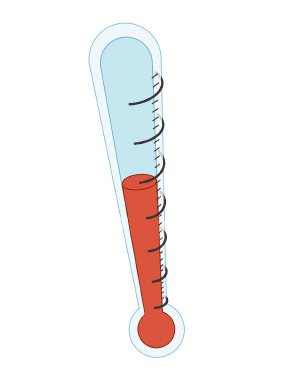Dell Rapids Public School News
12/14/2007
When Sickness Strikes: Know When to Keep a Child Home from School
 A parent’s decision to keep a child home from school when he or she is sick can sometimes be a difficult one. No parent wants to interrupt their child’s learning, and for some, keeping a child home means missing work or losing pay. However, if he or she has a serious illness such as influenza, it’s important for the child to stay home from school. By taking this step, parents can help their children get better faster as well as prevent the spread of illness to others. The following are some frequently-asked questions and answers to aid parents in decision making this flu season.
A parent’s decision to keep a child home from school when he or she is sick can sometimes be a difficult one. No parent wants to interrupt their child’s learning, and for some, keeping a child home means missing work or losing pay. However, if he or she has a serious illness such as influenza, it’s important for the child to stay home from school. By taking this step, parents can help their children get better faster as well as prevent the spread of illness to others. The following are some frequently-asked questions and answers to aid parents in decision making this flu season.
Q: Should I keep my child home from school if he or she has a cold or flu symptoms? Is your advice different for cold versus the flu?
A: If your child has flu symptoms, you should keep him or her home from school. If you child has a cold, the decision to keep him or her home may depend on the severity of symptoms. A good rule of thumb is to keep your child home if he or she has a fever of 100 degrees or higher.
It’s also important to know the difference between cold and flu. Flu is a serious illness, and children who have the flu should always stay home from school. Flu symptoms include fever, along with chills, cough, sore throat, headache or muscle aches. Many people describe it “like being hit by a truck.” It is a good idea to contact the child’s doctor if he or she has these symptoms. Symptoms of a common cold include stuffy nose, sneezing, sore throat and hacking cough. Often, cold symptoms come on gradually. Although the common cold is usually not serious, if the symptoms are severe, it’s a good idea to keep your child home to rest and get better.
Q: If my child does have the flu or a bad cold, how long should I keep him or her home from school?
A: Parents should keep their sick children home from school until they have been without fever (temperature under 100 degrees) for 24 hours, to prevent spreading illness to others. Flu is spread from person to person through coughing and sneezing. Occasionally, people can get the flu from toughing a germ-infested surface. Children are one of the biggest sources of flu spread.
Q: Should I call the doctor if I think my child has the flu?
A: If a child experiences flu symptoms, parents should contact their child’s doctor quickly. Some children may benefit from an antiviral medication, which can be prescribed by a doctor and can help lessen the number of days that a child is sick with the virus. To be effective, antiviral medications should be taken within 12-48 hours after flu symptoms begin.
Q: What should I do to help prevent the rest of the household from getting sick?
A: Teach and practice healthy habits. Wash your hands often with soap and warm water for at least 20 seconds to help prevent germs from spreading. Avoid touching your eyes, nose and mouth, because the virus can spread when your hands touch surfaces that are infested with germs. Also, consider contacting your doctor if someone in your household gets the flu. A doctor can prescribe antiviral medication that can actually prevent other members of the household from catching the virus.